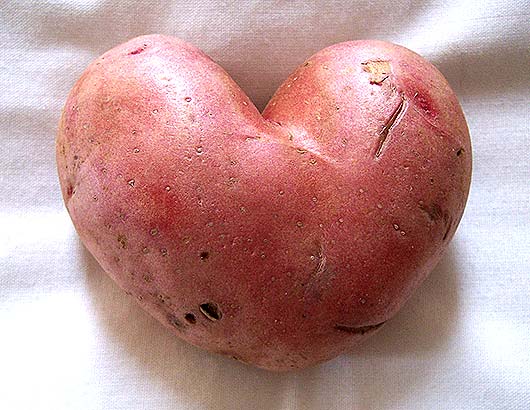HOME - INTRODUCTION - CAST
Love Potato
Mom made a delicious potato-and-zucchini dish with parmesan cheese and onions. We had the leftovers in our lunch the next day. In school, we are learning lots of English from having to learn Spanish. In language class, the teacher always gives us homework, like writing sentences using words that she gives us. Once, she gave us a long list of words that we had to find definitions for in the dictionary. When I got home, I finished copying the definitions from the Spanish dictionary, and then looked on the Internet to learn what they meant in English. The problem was that, when I translated the words using the online Spanish-English dictionary, I still didn't know what they meant in English! For example: "Follaje" in Spanish means "foliage" in English, but I had never heard of the word "foliage," so I had to look it up in the English dictionary to find out what it meant. The same with "Oscilar" in Spanish, which means "oscillate" in English. Also, there were words that did not translate very easily into English, like "vociferar" (talk loudly), and "prorrumpir" (react suddenly to a feeling---not even Dad knew this one!). We also just had a second spelling test. After failing the first one, I studied hard for this one and did my best on it. And when I got it back the next day, I was surprised to see a big "7" on the page. The teacher even wrote "Very Good," and congratulated me in front of the class, and everyone clapped. I think learning Spanish in Chile is difficult because they use so many words (slang) that are not in the dictionary---and many of those words come from English, but they change them as if they were Spanish words---when they are NOT. For example, the word for "lunch" in Spanish is "almuerzo." But my classmates don't have a Spanish word for their lunchboxes. They just use "lonchera," which is not a Spanish word. "Lonch" is how "lunch" sounds in Spanish, and they just add "era" to make it sound Spanish. Why don't they just call it "almuerzera"? Another word like that is "wikén," which is the English word "weekend" changed to the way they say it here, instead of using the real Spanish: "Fin de semana." One more: People always add the question "Cachai?" at the end of almost every sentence. It comes from the English word "catch," and the question means something like "Get it?" So a classmate will be telling me a story like this: "I was having lunch with my family, cachai? And then the phone rang, cachai? And it was my grandmother, cachai?" Kids also love to say, "¡Ya, Po!" all the time. It means something like "Come on!" or "That's enough!" Example: "Ya, Po! I don't want to play that game anymore!" Dad heard a story about an American who studied Spanish for years and thought he knew a lot, until he came to Chile and couldn't understand a word of what people were saying. The man was so depressed about it, he decided to write a book ("How to Survive in the Chilean Jungle") to translate all the Chilean Spanish into real Spanish. On weekdays, if I have done my homework, I get to play computer games. The games I play the most are Neopets and a penguin game I just discovered (one of my classmates told me about it), where you create a penguin and buy pets for it and make it walk around town, playing games and chatting. On Neopets, you create your own pets, and they are different and cuter than real pets. You earn Neopoints ("Neopian currency") by playing games that you can play up to 3 times a day. Then you use your Neopoints to buy things for your pets. Dad said that instead of spending so much time "playing someone else's game," why not make my own? RJE and I thought that would be very cool, so we got to work right away. But it's not easy, and it's a lot of work. Dad helped us to learn the basics of a software called Flash, which he says is the one used to make most online games. We had an idea to make a mini movie for RatSoap, and called it the "Help Kitty!" game, although it's not much of a game because it is very simple and it only requires you to click on one button. So here it is, our first online "game." Your browser will need to have Flash installed to be able to view it. RJE did Kitty's voice, if you can hear it. So just click on the yellow square to HELP Kitty!
Write back to the rats at The RatSoap™ Project is a work in progress, 2006-2007
|

